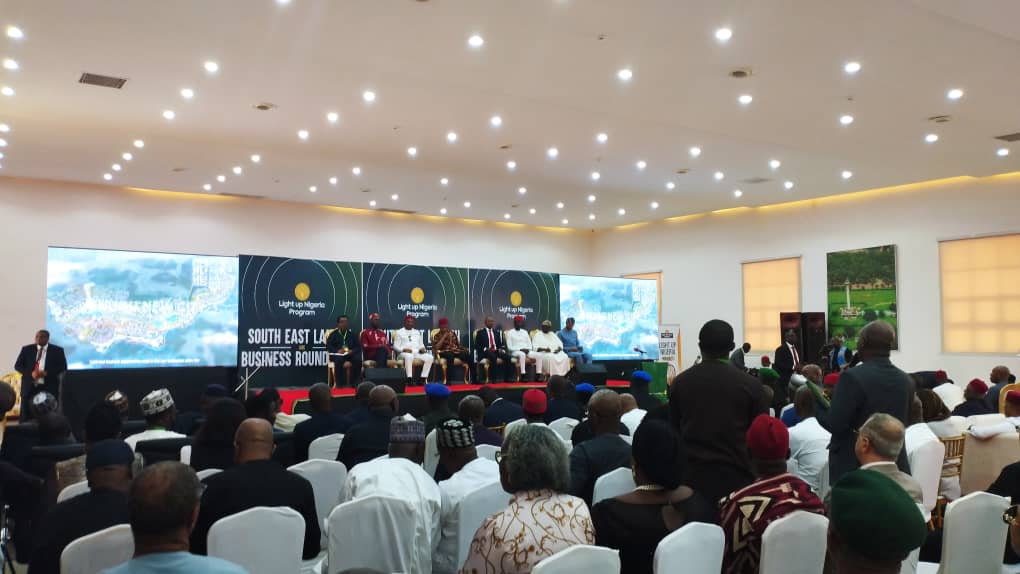Ben Ezechime, Enugu
Vice President Kashim Shettima has said that President Bola Ahmed Tinubu means well for the South-East region of Nigeria.
Shettima said this while speaking at the South-East Business Roundtable organised by the Niger Delta Power Holding Company with the theme, “Lighting up South East.”
The vice president said that the administration of Tinubu was desirous of partnering with the South-East for industrial growth of the country.
In his speech, Governor Peter Mbah, of Enugu State said that the Light-Up Nigeria Project signaled a new dawn for power and industrialisation of the South-East region, saying the initiative aligns with his administration’s disruptive approach to governance underpinned by thinking outside the box.
Mbah, while commending the Federal Government and the Niger Delta Power Holding Company (NDPHC) for coming up with the project to ramp up power supply to industrial clusters in the South-East, enjoined industrialists of the region to fully key into it and take advantage of the initiative to remove any bottlenecks they face regarding power availability.
“The Light up Nigeria Project Today is, in my view, a new dawn for power in the South-East and one of the most innovative initiatives in the power sector. This project is of critical importance since it deals with the power sector, which I believe is pivotal to economic growth. Indeed, if we fix power, a lot of other sectors would fall into place.
“This project ensures efficient dispatch of power to the largest consumers via bilateral sales agreements, which overides the existing bulk purchase arrangements through NBET, leveraging on a willing buyer, willing seller structure.
“The Programme will certainly bring improved access to affordable power to the South-East. This will in turn result in reduced power costs for the productive sector and enable them improve enhanced productivity and generate jobs. This is critical in this day where the country is pushing to boost production and drive-up exports to ultimately shore up our domestic currency.
“Therefore, this project aligns completely with our approach to governance in Enugu in the sense that it is a very disruptive initiative, which shows a deep ability to think outside the box. Today’s Nigeria requires a marked departure from business as usual to business unusual.”
He pledged his government’s continued support to industrialists and other private investors across the state to complement the undeniable boost that the Light-up Nigeria Project would bring.
Speaking, the Managing Director and CEO of NDPHC, Mr Chuedu Ugboo said the company was responsible for implementing the National Integrated Power Project (NIPP) and operates a portfolio of gas thermal electricity generation assets in Nigeria.
He said that the optimal utilisation of these assets has been hindered by technical challenges including the lack of sufficient transmission and distribution infrastructure to transport power from the plants.
“To underscore this point, just last Friday, we received the Honourable Minister of Power at our 500MW Benin (Ihovbor) Power Plant.
“This power plant shares the transmission facilities with Azura-Edo Power plant next door with over 460 MW.
“The two plants together can generate over 900MW, ” Ugboo said.
He however, said that the Transmission Company of Nigeria (TCN) was working towards resolving the constraint in that power plant.
According to him, “Another challenge stems from financial difficulties in the electric power sector here in Nigeria, leading to inadequate payments by distribution companies and Nigeria Bulk Electricity Trading Company (NBET) to generation companies like NDPHC.
“The huge indebtedness to the generation companies affects the ability of the generation companies to pay for gas supply leading to gas supply shortage and the resulting low generation.
“At a recent press conference, the Honourable Minister of Power, rightly identified this severe liquidity crisis as a major impediment to electric
“He added that out of ver N1.3 trillion owed to generation companies. NDPHC alone was owed close to N200 billion.
“These challenges of lack of sufficient transmission and distribution infrastructure to transport electricity from the plants and the sector market liquidity crisis have resulted in gross underutilisation of installed generation assets with unserved potential grid electricity consumers, particularly industries (some of which are represented here today), resorting to expensive and often inefficient self generation.
“In response to these challenges, NDPHC initiated the Light up Nigeria Project, which aims to provide reliable and affordable electricity supply to industries and homes by utilising under-utilised generation capacity, establishing trading agreements with bulk purchasers of electricity, and mobilising investments to address technical, commercial, and collection losses in the supply chain,” Ugboo said.

